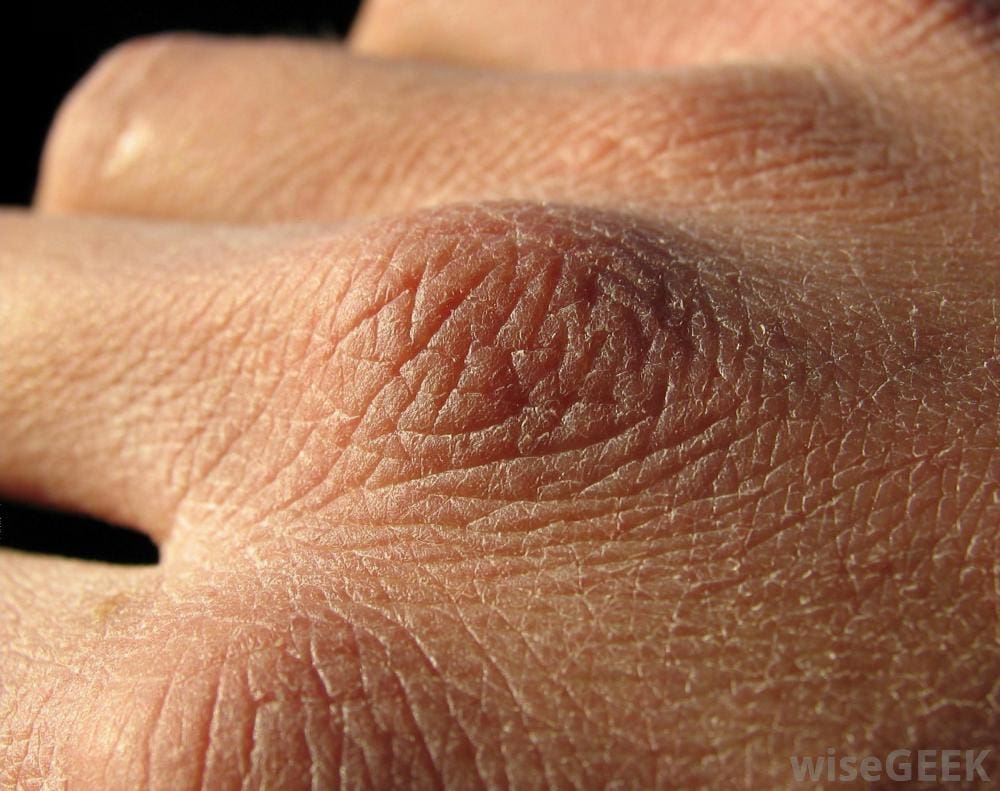The water in your house may be the reason why you suffer from itchy skin and dry hair. So what are the signs of hard water on hair and skin? Hard water can transform your hair from soft and smooth to rough and brittle. It may also cause the skin to become flaky and dry out. Hard water irritates individual hair shafts and makes them scratchy and extremely difficult to manage.
People who are prone to acne do not react well to hard water. Their texture will worsen because of the large amounts of minerals found in hard water that clog pores and cause breakouts and inflammation. On the other hand, soft water contains fewer impurities and works better with soap to clean your skin and hair more effectively.
The best way to combat the effects of hard water on your skin and hair is to soften the water in your home.

Dry skin
Effects of hard water
Before we delve into soft water, it is crucial to understand the effect of hard water on hair and skin. In some cases, hard water is not hazardous for consumption though it has adverse and frustrating impacts on the body and physical appearance.
The hardness of your water determines how effective your shampoo and soap are. If you buy more expensive products to try and repair dry skin or damaged hair and you find them not working, it may be because of the water in your home.
Water hardness may not affect the water’s safety level. In some cases, soft and hard water can be used as drinking water. In other cases, the hardness of the water may make it difficult to consume, giving out a bad taste and odor. Additionally, the chemical compounds will make your hair and skin feel rougher. Over-the-counter products such as special shampoos and soaps designed for dry hair and skin will do little to solve your problem.
How does water become hard?
Rainwater is naturally soft. When the water falls to the ground, it dissolves through the soil and absorbs various mineral compounds such as magnesium, iron, and calcium, which causes it to be hard. Water from wells already has these compounds, which is why they are considered hard.
Soap has sodium which reacts negatively with the minerals in hard water. As a result, it’s more difficult to lather, and overall, it’s less effective. On top of drying your hair and skin, hard water also weakens body washes and shampoos.
Rain Water To Hard Water
What to do about hard water
The best way to achieve soft skin and hair is with a water softener. The water softener will filter the minerals out of the water (calcium and magnesium) that comes into your home and ensure that your water is as soft as possible before it enters any of your faucets.
Soft water can help treat acne and other conditions because it helps minimize irritation due to fewer contaminants. Additionally, soft water will improve soap consistency, making it easier to take a bath or wash your hair.
What is soft water?
As mentioned previously, soft water is very different from hard water, especially in taste. Soft water contains lower amounts of minerals. Soft water is easier on your body and on your appliances. Here are a few reasons why you should soften the water in your home.
Soft water will improve your hair’s shine and texture
Softening in your home will go a long way in improving the health of your hair. Hard water minimizes shampoo’s effectiveness, causing it to lather and rinse out poorly. The shampoo will build up in your hair, causing it to look dull and making it more difficult to style.
Hard water makes color and highlights in your hair fade much faster. Soft water will extend the longevity of the color, saving you trips to the salon for color treatments. Installing a water softener will go a long way in maintaining the health of your hair.
Signs of Hard Water on Hair & Scalp
The shampoo will build up in your hair if you use hard water to wash it. The build-up will lead to a dry and itchy scalp. Soft water prevents this build-up, ensuring that your hair rinses clean. Besides dryness and itchiness, it will help you prevent rashes and dandruff.
Dandruff
Signs of Hard Water on skin
The reaction between hard water and soap leaves behind an itchy, dry residue on your skin. If you install a water softener, you will notice that the soap lathers easily, wash better, and there is no residue on your skin. Additionally, hard water contains minerals that dehydrate your skin and lead to dry skin conditions such as eczema.
Dry skin caused by hard water may lead to breaking out. Your skin will naturally produce more oil when it becomes too dry. Excess oil production is a direct cause of acne. The minerals found in hard water will also react with the natural oils leading to breaking out. Soft water will not react like this with your skin.
All in all, installing a water softener is very important for the health of your hair and skin
Skin & Hard Water
